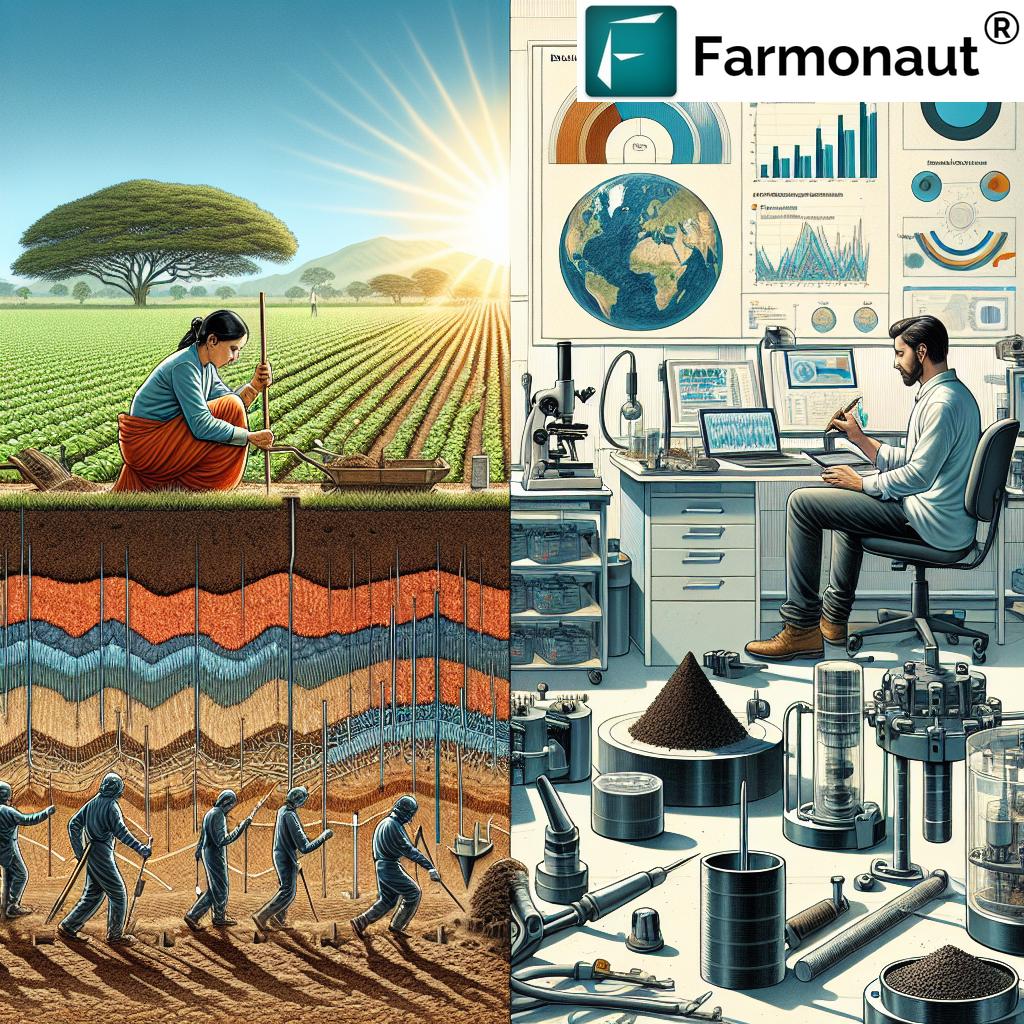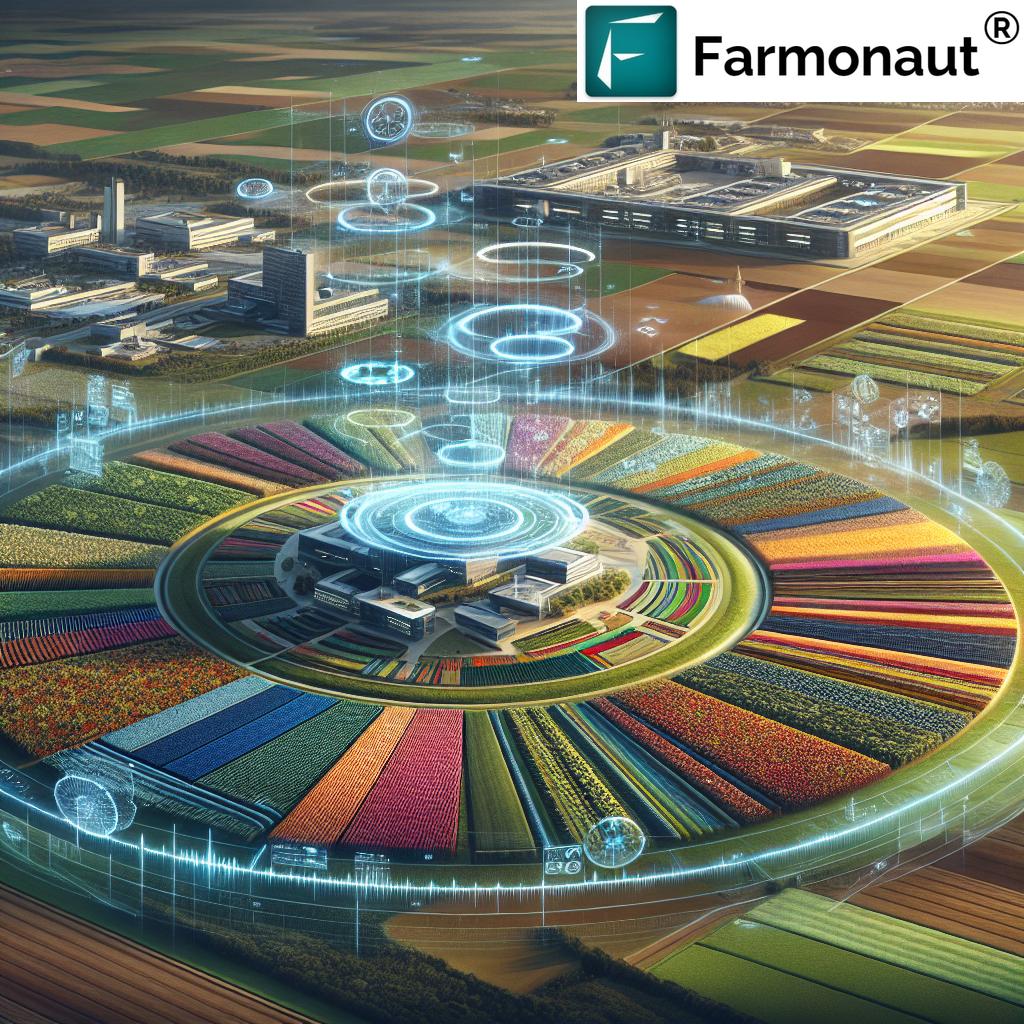Advancing Soil Science: Professional Certification and Sustainable Practices in America’s Agricultural Landscape

“Over 90% of certified soil scientists engage in ongoing professional development through webinars and conferences annually.”
In the ever-evolving landscape of American agriculture, soil science stands as a cornerstone of sustainable farming practices and effective agricultural soil management. As we delve into the world of soil science certification and the qualifications of professional soil scientists, we uncover the crucial role these experts play in shaping the future of our nation’s agricultural productivity and environmental stewardship.
At Farmonaut, we recognize the immense value that certified soil scientists bring to the table. Our satellite-based farm management solutions complement the expertise of these professionals, providing advanced tools for precision agriculture soil mapping and soil fertility management. By combining cutting-edge technology with the deep knowledge of soil scientists, we’re helping to drive innovation in agritech and support farmers in implementing climate-smart agricultural practices.
The Importance of Soil Science Certification
Soil science certification programs in the United States have become increasingly rigorous and comprehensive, reflecting the growing complexity of agricultural challenges and the need for specialized expertise. These certifications, overseen by national and state boards, ensure that professionals in the field possess the necessary knowledge and skills to address critical issues in soil health and sustainability.
- Establishes credibility and expertise in the field
- Ensures up-to-date knowledge of soil science principles and practices
- Promotes adherence to ethical standards and best practices
- Enhances career opportunities and professional recognition
The certification process typically involves a combination of educational requirements, practical experience, and comprehensive examinations. Let’s explore the various pathways to becoming a certified soil scientist in America.
Pathways to Soil Science Certification
Aspiring soil scientists in the United States have several options for obtaining professional certification. The most prominent certifications include:
- Certified Professional Soil Scientist (CPSS): Offered by the Soil Science Society of America (SSSA)
- State-Specific Certifications: Many states, including Florida, Ohio, and Pennsylvania, have their own certification programs
- Specialized Certifications: Focus areas such as precision agriculture or soil fertility management
Let’s take a closer look at the requirements and processes for these certifications:
| Certification Name | Governing Body | Educational Requirements | Experience Needed | Exam Details | Recertification Process |
|---|---|---|---|---|---|
| Certified Professional Soil Scientist (CPSS) | Soil Science Society of America (SSSA) | Bachelor’s degree in soil science or related field | 5 years of professional experience | Comprehensive written exam | Continuing education credits every 2 years |
| Florida Professional Soil Scientist | Florida Department of Agriculture and Consumer Services | Bachelor’s degree in soil science or related field | 4 years of professional experience | State-specific exam | Annual renewal with continuing education |
| Ohio Certified Soil Scientist | Ohio Department of Agriculture | Bachelor’s degree in soil science or related field | 3 years of professional experience | Written and field exams | Biennial renewal with continuing education |
| Precision Agriculture Specialist | American Society of Agronomy | Bachelor’s degree in agronomy or related field | 2 years of precision ag experience | Specialized exam on precision agriculture | Continuing education credits every 2 years |
These certifications not only validate a professional’s expertise but also demonstrate a commitment to ongoing education and adherence to ethical standards in the field of soil science.
Educational Pathways in Soil Science
The journey to becoming a certified soil scientist often begins with a strong educational foundation. Universities across the United States offer comprehensive undergraduate and graduate programs in soil science and related fields. These programs provide students with the theoretical knowledge and practical skills necessary for a successful career in soil science.
- Undergraduate Programs: Bachelor’s degrees in Soil Science, Environmental Science, or Agronomy
- Graduate Programs: Master’s and Ph.D. programs focusing on advanced soil science concepts and research
- Specialized Courses: Soil chemistry, soil physics, soil microbiology, and soil fertility management
Many universities also offer online courses and distance learning options, making education in soil science more accessible to students across the country. These programs often incorporate the latest technologies and methodologies used in precision agriculture and sustainable farming practices.
The Role of Professional Soil Scientists in Modern Agriculture
Certified professional soil scientists play a crucial role in advancing sustainable farming practices and optimizing agricultural productivity. Their expertise is invaluable in various aspects of modern agriculture:
- Precision Agriculture Soil Mapping: Creating detailed soil maps to guide precision farming techniques
- Soil Fertility Management: Developing tailored nutrient management plans for optimal crop yields
- Water Resource Efficiency: Implementing strategies to improve water retention and reduce runoff
- Environmental Soil Analysis: Assessing soil health and identifying potential contaminants
- Soil Conservation Techniques: Designing erosion control measures and sustainable land use practices
At Farmonaut, we recognize the importance of these professionals in driving sustainable agricultural practices. Our satellite-based crop health monitoring and AI-powered advisory systems complement the work of soil scientists, providing real-time data and insights to support their decision-making processes.

Ongoing Professional Development in Soil Science
“Soil science certification programs in the US have seen a 30% increase in enrollment over the past decade.”
The field of soil science is constantly evolving, with new research and technologies emerging regularly. To maintain their certifications and stay at the forefront of their profession, soil scientists engage in continuous learning and professional development activities.
- Webinars and Online Courses: Covering the latest advancements in soil science and agricultural practices
- Conferences and Workshops: Opportunities for networking and knowledge exchange with peers and experts
- Research Participation: Collaborating on studies to advance soil science knowledge
- Industry Publications: Staying updated through scientific journals and industry magazines
Many professional organizations, such as the Soil Science Society of America, offer memberships that provide access to exclusive resources, publications, and professional development opportunities. These organizations also play a crucial role in shaping policies related to soil management and conservation at both state and federal levels.
Leveraging Technology in Soil Science
The integration of technology in soil science has revolutionized the way professionals approach agricultural soil management. At Farmonaut, we’re at the forefront of this technological revolution, providing tools that complement the expertise of soil scientists:
- Satellite-Based Crop Health Monitoring: Our platform utilizes multispectral satellite imagery to provide real-time insights into vegetation health and soil moisture levels.
- AI-Powered Advisory Systems: Our Jeevn AI system analyzes data to generate personalized recommendations for crop management.
- Precision Agriculture Tools: We offer solutions for precise soil mapping and targeted resource application.
Explore Farmonaut’s API | API Developer Docs
The Impact of Soil Science on Sustainable Farming Practices
Certified soil scientists are at the forefront of developing and implementing sustainable farming practices that address critical environmental challenges:
- Climate Change Mitigation: Developing soil management techniques to enhance carbon sequestration
- Biodiversity Conservation: Promoting practices that support soil ecosystem diversity
- Water Conservation: Implementing strategies to improve water use efficiency in agriculture
- Nutrient Management: Optimizing fertilizer use to reduce environmental impact while maintaining crop yields
These efforts not only contribute to environmental conservation but also help farmers improve their long-term productivity and profitability. At Farmonaut, we support these initiatives by providing tools for efficient resource management and sustainable farming practices.
The Future of Soil Science in America
As we look to the future, several trends are shaping the field of soil science and its role in American agriculture:
- Increased Focus on Soil Health: Growing recognition of soil as a living ecosystem
- Integration of Big Data and AI: Leveraging advanced analytics for more precise soil management
- Climate-Smart Agriculture: Developing strategies to adapt to and mitigate climate change impacts
- Interdisciplinary Collaboration: Combining soil science with other fields like microbiology and data science
These trends underscore the importance of ongoing professional development and the need for soil scientists to stay adaptable in a rapidly changing field.
Farmonaut’s Contribution to Soil Science and Sustainable Agriculture
At Farmonaut, we’re committed to supporting the work of soil scientists and advancing sustainable agricultural practices. Our technology complements the expertise of certified professionals, providing tools that enhance their ability to make informed decisions and implement effective soil management strategies.
- Real-Time Data Analysis: Our satellite-based monitoring provides up-to-date information on soil and crop conditions.
- AI-Driven Insights: We offer personalized recommendations based on comprehensive data analysis.
- Precision Agriculture Support: Our tools enable targeted interventions for optimal resource use.
- Sustainability Tracking: We help monitor and reduce the environmental impact of agricultural practices.
Download Farmonaut’s Mobile Apps:


Conclusion
The field of soil science is crucial to the future of sustainable agriculture in America. Through rigorous certification programs, ongoing professional development, and the integration of advanced technologies, soil scientists are well-equipped to address the complex challenges facing modern agriculture. As we continue to navigate issues like climate change, water scarcity, and the need for increased food production, the expertise of certified soil scientists will be more valuable than ever.
At Farmonaut, we’re proud to support this community of professionals with our innovative agritech solutions. Together, we’re working towards a more sustainable and productive agricultural future for America and beyond.
FAQ Section
Q: What is the importance of soil science certification?
A: Soil science certification ensures that professionals have the necessary expertise to address critical issues in soil health and sustainability. It establishes credibility, promotes adherence to ethical standards, and enhances career opportunities in the field.
Q: How can I become a certified soil scientist in the US?
A: To become a certified soil scientist, you typically need a bachelor’s degree in soil science or a related field, several years of professional experience, and to pass a comprehensive exam. Specific requirements vary by certification program and state.
Q: What role do soil scientists play in precision agriculture?
A: Soil scientists are crucial in precision agriculture, creating detailed soil maps, developing tailored nutrient management plans, and implementing strategies for efficient water use and soil conservation.
Q: How does Farmonaut support soil scientists and sustainable agriculture?
A: Farmonaut provides advanced satellite-based monitoring tools, AI-driven insights, and precision agriculture support that complement the work of soil scientists, enabling more informed decision-making and efficient resource management.
Q: What are some emerging trends in soil science?
A: Emerging trends include an increased focus on soil health as a living ecosystem, the integration of big data and AI in soil management, climate-smart agricultural practices, and interdisciplinary collaborations with fields like microbiology and data science.




